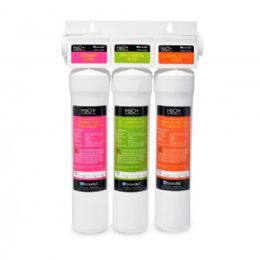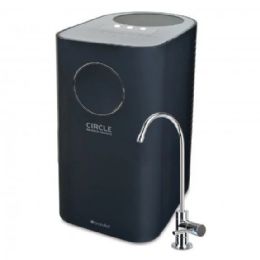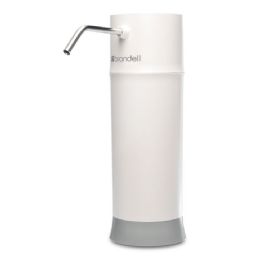Water Filters are used to remove unwanted impurities from water like microbial contaminants which can carry viruses, bacteria, and inorganic contaminants like sediment, salts, metals, pesticides, herbicides, and organic chemical contaminants. Various types of water filters include a Whole House Water Filter, Under Sink Filter, Countertop Water Filter, Faucet Filter, and Reverse Osmosis Systems which are designed to provide high-quality drinking water. These water filters use up to 5 different types of physical or chemical filtration to remove water impurities.



Physical Filtration vs. Chemical Filtration
Water filters use two different techniques to remove dirt, physical filtration which is straining water through a barrier to remove larger impurities or chemical filtration that involves passing water through an active material to remove impurities chemically as they pass through.
There are 5 main types of filtration and they employ a mixture of physical and chemical techniques.
Mechanical Water Filter
Mechanical filters vary from a basic mesh device that filters out large sediment and debris to a ceramic filter that can provide an extremely complex pore structure for an ultra-fine filtration of pathogenic organisms. This type of filter will usually be given a micron rating which indicates how effective the filter will be in terms of the size of the particles it is capable of removing. Common ratings will include:
Activated Carbon
Activated Carbon Water Filters use a process called Absorption which is highly effective at capturing water-borne contaminants. Commonly using what is known as activated carbon granules derived from charcoal, this very porous form of carbon is packed with nooks and crannies that help attract and trap chemical impurities through a process called absorption. Absorption is where liquids become trapped by carbon granules to remove many common impurities such as chlorine-based chemicals, pesticides, and industrial solvents.
Some impurities that Activated Carbon may not filter are hard water impurities such as limescale, heavy metals, fluorine, sodium, and nitrates.
Reverse Osmosis
Reverse Osmosis is forcing contaminated water through a membrane, or a very fine filter. This process of removing dissolved inorganic solids such as magnesium and calcium ions from water is done by forcing it through a semipermeable membrane under pressure so that the water passes through leaving behind the contaminants. This highly effective way of purifying water is usually combined with a number of other filters such as a mechanical (sediment) filter and an absorption (activated carbon) filter to help clean water up to 99.9-percent.
Ion Exchange Filters and Sequestration
Ion-Exchange Water Filters and Sequestration Filters are primarily used for "softening" water by removing calcium and magnesium minerals, or limescale (ion-exchange), or isolating calcium and magnesium minerals (sequestration). Ion Exchange Filters are designed to split apart atoms to make electrically charged atoms exchange “bad” ions such as magnesium and calcium ions and release their own sodium ions to replace them, making the water taste softer or more palatable.
Resins prevent hard water limescale from coating your pipes used for showering and flushing but aren’t usually used in drinking water filters due to the amount of salt that can be legally present in drinking water (200 milligrams/liter). A hydrogen-based ion-exchange resin filter is preferred for filtering drinking water.
Sequestration commonly uses food-grade polyphosphate limescale inhibiting filter to remove calcium and magnesium minerals that can cause the layering of limescale and the corrosion of pipes and appliances. Polyphosphate sequestration works to prevent limescale forming on any pipe surfaces.
Overall, drinking clean, filtered water will help protect your body from diseases and lead to greater overall health. Achieve a higher quality of life when water filtration goes beyond drinking water and is used in the whole house for cooking, brushing teeth, showering, and bathing.
How to Choose the Best Water Filter for You
How can you tell that the water you're about to drink hasn't picked up all kinds of nasties on its journey through the atmosphere, groundwater, or water pipes? If you want to be sure your county municipal water or your well water is safe to drink, you can run it through a water filter. Each water filter is designed to filter a different type of contaminant or water quality issue so the correct water filter needed will depend on a brief understanding of your water composition.
To find the best water filter for you, first, understand the source of your tap water. For urban public tap water, a high-quality activated carbon water filter is generally more than enough to mechanically remove large debris. For well water in places of unknown origin, a combination of Reverse osmosis, Ion-exchange filters, or UV filters might be needed to fully remove contaminants and microorganisms.
In some urban areas, inadequate management of the city and industrial water brought in from a lake, river, or aquifer means the drinking water of millions of people could be contaminated or chemically polluted. Inadequate regulations for rural water can pollute the groundwater that feeds hundreds if not thousands of personal household wells with agricultural wastewater or chemical spills.
In its simplest form, a water filter helps decontaminate water by either using a physical barrier, chemical process, or biological process. For example, a person will use water filters to help remove chlorine and bacterial contaminants from the water to provide better tasting and better smelling drinking water.
Filtered water can also help children’s developing immune systems grow strong. Water filtration systems reduce the risk of gastrointestinal disease by more than 33-percent, greatly reduce the risk of colon cancer, rectal cancer, and bladder cancer by removing excess chlorine and chlorine byproducts. A water filter can act as the last line of defense against over 2,100 known toxins within your drinking water.